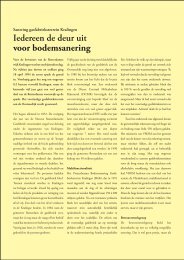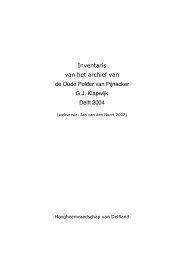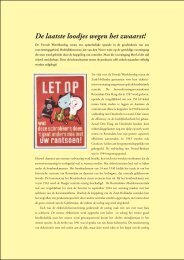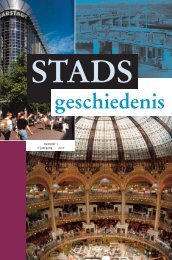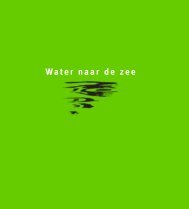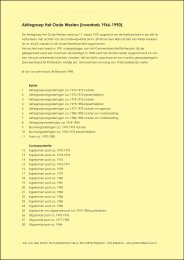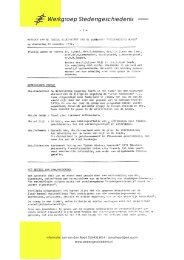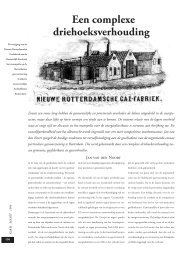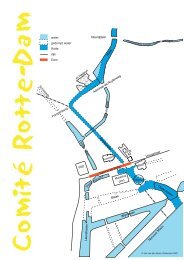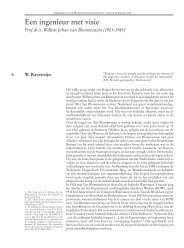Net Werk voor de Geschiedenis van Hygiene en Milieu, 1999-2001 ...
Net Werk voor de Geschiedenis van Hygiene en Milieu, 1999-2001 ...
Net Werk voor de Geschiedenis van Hygiene en Milieu, 1999-2001 ...
Create successful ePaper yourself
Turn your PDF publications into a flip-book with our unique Google optimized e-Paper software.
18<br />
19<br />
Making <strong>en</strong>vironm<strong>en</strong>tal history<br />
rele<strong>van</strong>t in the 21st c<strong>en</strong>tury<br />
A Joint Meeting of the American Society<br />
for Environm<strong>en</strong>tal History and<br />
the Forest History Society<br />
March 28 - April 1, <strong>2001</strong><br />
in Durham, North Carolina.<br />
Distinguished Lectureship in Forest<br />
and Conservation History “Smokechasing:<br />
The Search for a Usable<br />
Place” giv<strong>en</strong> by Dr. Steph<strong>en</strong> Pyne<br />
Professor, Biology Dept., Arizona<br />
State University and Fire Historian<br />
Banquet Speaker ‘Man and Nature<br />
in the 21st C<strong>en</strong>tury’ giv<strong>en</strong><br />
by Dr. David Low<strong>en</strong>thal Professor<br />
Emeritus, University College<br />
London and George Perkins Marsh<br />
Biographer.<br />
Plus: First Night Pl<strong>en</strong>ary Session<br />
with: Norman Christ<strong>en</strong>s<strong>en</strong>, Nancy<br />
Langston, Patty Limerick, and Donald<br />
Worster<br />
180 Technical Papers Breakfast discussion<br />
groups<br />
Field Tours Entertainm<strong>en</strong>t by the<br />
Coastal Cohorts, Exhibits and Poster<br />
Session Contacts at Duke University,<br />
NCSU, UNC, the National<br />
Humanities Council, and research<br />
facilities of the NIEHS, EPA and<br />
the U.S. Forest Service<br />
Follow the FHS Web site at http://<br />
www.lib.duke.edu/forest/ for information<br />
updates.<br />
http://www.lib.duke.edu/forest/jtconf.html<br />
European University Institute (EUI)<br />
Native, naturalized,<br />
and exotic species<br />
in European history<br />
20-21 April <strong>2001</strong> Flor<strong>en</strong>ce<br />
- How have animals and plants<br />
moved across Europe to alter human<br />
history<br />
- Wh<strong>en</strong> have Europeans consi<strong>de</strong>red<br />
exotic species good or bad and why<br />
- How has treatm<strong>en</strong>t of non-human<br />
species recapitulated treatm<strong>en</strong>t of<br />
human species<br />
- How has Europe’s global biological<br />
exchange altered world history<br />
Our goal is to explore Crosby’s themes<br />
about ecological exchange on<br />
a European level. Our hope is that<br />
we can attract a small, <strong>en</strong>thusiastic<br />
group of scholars to discuss these<br />
fascinating topics in a remarkable<br />
setting. . All discussions will be held<br />
in English. An appropriate workshop<br />
publication is anticipated.”<br />
Luisa Passerini, professor Peter<br />
Becker, professor Marcus Hall, Jean<br />
Monnet Fellow -Workshop Coördinator<br />
E-mail: hall@wsl.ch<br />
Departm<strong>en</strong>t of History & Civilization<br />
European University Institute<br />
Villa Schifanoia,<br />
Via Boccaccio 121,<br />
I-50133 Fir<strong>en</strong>ze - Italy<br />
http://www.iue.it/<br />
(beslot<strong>en</strong> bije<strong>en</strong>komst)<br />
18<br />
19<br />
68<br />
contactblad <strong>van</strong> <strong>de</strong><br />
stichting net werk <strong>voor</strong> <strong>de</strong><br />
1078-1079<br />
geschie<strong>de</strong>nis <strong>van</strong> hygiëne <strong>en</strong> milieu<br />
redactie: myriam d a r u<br />
webversie: jan <strong>van</strong> <strong>de</strong>n n o o r t<br />
19<br />
20<br />
Climate Change and Variability<br />
in Northern Europe<br />
Proxy Data, Instrum<strong>en</strong>tal<br />
Records, Climate Mo<strong>de</strong>ls and<br />
Interactions<br />
Second international symposium CLIC<br />
Turku, Finland, 6-8 June <strong>2001</strong><br />
Background<br />
Climate change is wi<strong>de</strong>ly consi<strong>de</strong>red<br />
as one of the most consi<strong>de</strong>rable<br />
<strong>en</strong>vironm<strong>en</strong>tal changes taking place<br />
globally. Climate is a continuous<br />
process, which at times shows rapid<br />
changes, and sometimes, g<strong>en</strong>tle<br />
drifts or fluctuations. The mutual<br />
threat shared by societies is largely<br />
based on the fact that we do not<br />
know what to expect about future<br />
climates on a regional scale. Although<br />
the un<strong>de</strong>rstanding of climatic<br />
parameters and their complex<br />
interactions on differ<strong>en</strong>t spatial and<br />
temporal scales is improving rapidly,<br />
there are still many chall<strong>en</strong>ging,<br />
unanswered questions with regard<br />
to pot<strong>en</strong>tial future climates.<br />
Objective<br />
The aim of the interdisciplinary<br />
symposium is to bring together sci<strong>en</strong>tists<br />
studying climate dynamics<br />
in a broad s<strong>en</strong>se and to foster communication<br />
betwe<strong>en</strong> sci<strong>en</strong>tists and<br />
interest groups applying sci<strong>en</strong>tific<br />
knowledge on mitigation and adaptation<br />
for climate change.<br />
For the <strong>de</strong>tection, attribution and<br />
forecasting of climate change, the<br />
<strong>de</strong>velopm<strong>en</strong>t of sophisticated climate<br />
mo<strong>de</strong>ls is fundam<strong>en</strong>tal. I<strong>de</strong>ally,<br />
for the purpose of projecting future<br />
climates, climate mo<strong>de</strong>ls should be<br />
able to a<strong>de</strong>quately<br />
1) repres<strong>en</strong>t the curr<strong>en</strong>t climate,<br />
2) reproduce interannual and <strong>de</strong>cadal<br />
climate variability for a giv<strong>en</strong><br />
history of external forcings (based<br />
on instrum<strong>en</strong>tal data),<br />
3) reproduce differ<strong>en</strong>t climate episo<strong>de</strong>s<br />
in the past (based on proxy<br />
data) and<br />
4) successfully simulate abrupt climate<br />
change ev<strong>en</strong>ts from the past.<br />
These requirem<strong>en</strong>ts call for close<br />
collaboration and sharing existing<br />
knowledge betwe<strong>en</strong> sci<strong>en</strong>tists from<br />
various fields, for example palaeo<strong>en</strong>vironm<strong>en</strong>talists,<br />
ecologists,<br />
atmospheric sci<strong>en</strong>tists, oceanographers<br />
and climate mo<strong>de</strong>llers, to<br />
name a few. Northwestern Europe<br />
and the North Atlantic are known<br />
to be most chall<strong>en</strong>ging regions in<br />
climate mo<strong>de</strong>ls. Various mo<strong>de</strong>ls<br />
predict very differ<strong>en</strong>t climates for<br />
the region. H<strong>en</strong>ce, there is a need<br />
to bring together sci<strong>en</strong>tists studying<br />
differ<strong>en</strong>t aspects of this region’s<br />
climate to share knowledge and<br />
un<strong>de</strong>rstanding of climate process.<br />
In the proxy record field, higher<br />
resolution thanks to new, ad<strong>van</strong>ced<br />
methods in sampling, <strong>de</strong>tection,<br />
computing and data analysis allows<br />
interesting comparisons with available<br />
instrum<strong>en</strong>tal records. Furthermore,<br />
better data will aid pinpoin-<br />
18/19<br />
<strong>Net</strong> <strong>Werk</strong> 68 - februari <strong>2001</strong><br />
19/20



